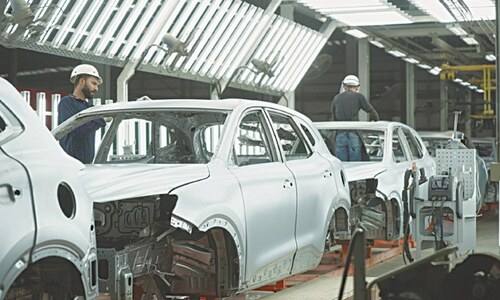ENTERING an auto vendor’s unit in North Karachi, one would expect it to be alive with the din of whirring machinery and the banging of metalworkers.
But here, nearly the entire assembly line is shrouded in darkness, save for a few lights left on for the sake of navigating the maze of machinery.
It is the same story on the first and second floors of the Half Man unit — which makes sheet metal parts for Pak Suzuki and Lucky Motors — the production lines are silent and workers conspicuous by their absence.
“We keep the lights off on inactive production lines to offset the overhead expenses, such as unbearable power bills,” Half Man Chief Executive Mohammad Shakir says, claiming that his plant is currently operating at 25 per cent capacity.
Those who diversified into plastics, non-automotive sectors are comparatively better off
“We have reduced our workforce to 28 skilled hands, down from around 100 some two years ago, by removing contractual and daily wagers since orders from assemblers are dwindling,” he told Dawn, recalling that his set-up used to consume 90,000 kg per of steel sheets every month. But last month, he said, no purchases were made.
The massive drop in auto sales has also caused anxiety to autopart makers, who are still wondering whether to close down their plants, or stand firm in this tough environment and wait for things to improve.
Mr Shakir is among those hoping for some betterment in the political environment, which may revive economic activities.
Syed Asad Ali Naqvi of Indus Engineering tells Dawn that they have retained only 30 of their 100 employees, with production down to a mere 10pc of what it used to be two years ago.
“We cannot offload the rest of the skilled and talented workforce, who have been part of the company for decades.”
But even with production down so much, Mr Naqvi claims their monthly power bill is still around Rs200,000-225,000, as compared to the Rs400,000-450,000 they used to pay during peak production around two years ago.
Adding to that are transportation charges, which have tripled in this same period. “We are even finding it hard to pay salaries, despite the low strength of workers,” he added.
Mashood Ali Khan, another auto part exporter based in the Korangi Creek area, said small- and medium-sized auto vendors were operating at 10-35pc capacity due to thinning orders from local assemblers.
However, some vendors are trying to survive this testing time by diversifying their business.
Many of those who acquired millions in bank financing to procure hi-tech imported machinery three years back, in anticipation of a rise in sales, are plagued by expensive financing due to rising interest rates, plant shutdowns and falling sales due to soaring prices.
Mr Khan said that vendors who had taken out loans to finance imported machinery are now finding it hard to pay off their monthly instalments due to high KIBOR rates.
Small- and medium-sized vendors need government support; the power sector should be directed to subsidise our soaring power bills. Wapda and K Electric can also help by reducing power rates for SMEs in the same way as the government has provided for consumers using less than 200 to 300 units, he says.
Galaxy Polymer Engineering makes plastic parts and lamps for Pak Suzuki, Ghandhara Industries Limited, Isuzu, Master Changan and Hinopak at their set-up in the Site Industrial Area. Their director, Abdul Rahman, however, is not too unnerved since he has diversified his business four years ago, making different parts for non-auto manufacturers as well as looking into exports of plastic items.
“Two years ago, we had 55 employees. Now, we have 42/43, despite the fact that only 35pc of the output of my factory is auto parts,” he said.
He said his company has invested Rs 16 million over the past four years, installing five to six injection-molding machines to keep pace with the production of automobiles. However, even he is feeling the pinch after a massive drop in the production of vehicles.
When asked how the company would recover its investment amid a sales lull in the auto sector, he said that the cost of doing business was only going up, and they were trying to survive on low profit. “We are running only two machines at night instead of a fully functional second shift to stave off unbearable power bills,” he said.
Aslam Feroz of Feroz Industries told Dawn that he was only left with 26/27 trained workers out of the 62-strong workforce he employed only two years ago. As a result, production at his sheet metal parts factory in Jahangirabad is also down to a mere 20pc. “We have also cut power to non-operational production lines to reduce power costs,” he says, adding that many vendors are selling their old assets, like real estate, to maintain their operations and manage employees’ salaries.
Published in Dawn, October 1st, 2023















































Dear visitor, the comments section is undergoing an overhaul and will return soon.